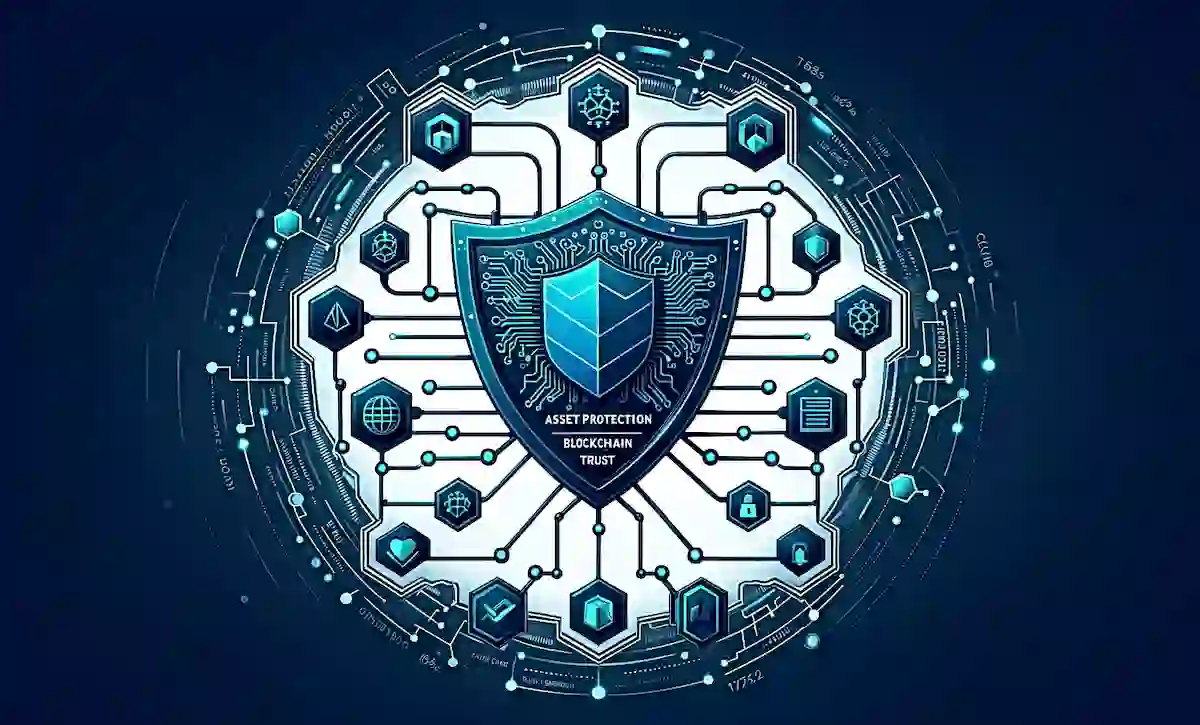Go Bitcoin! Blockchain technology initially caught the headlines for its role in cryptocurrencies, but 2024 will paint a bigger picture. This innovative technology is rapidly transforming industries far beyond finance, driving a wave of change that will redefine trust, transparency, and efficiency around the world. Imagine a world where a secure and transparent ledger tracks everything from the values root of your morning cup of coffee to the act of your designer clothes.
This blog explores the top 10 ways blockchain technology will transform the industry in 2024. From simplifying global supply chains to protecting intellectual property, get ready to discover how this breakthrough technology is shaping the future of business. Hold on tight, because the blockchain revolution is here and ready to impact every aspect of our lives in exciting ways. This is the power of blockchain. It is a decentralized database system that removes the need for brokers and permit users.
Also read! Top Ten Reasons To Join Stevens Applied Artificial Intelligence Course
What is Blockchain Technology?
In 2024, blockchain technology will continue to serve as an original shared ledger system. Imagine a secure digital record keeper that does not require a central power. Transactions are grouped into blocks and time-chained to verify Tamperproofing
This transparency allows businesses to track assets, securely record data, and help with trustless transactions without trust on a single entity. Looking ahead to 2024, blockchain will pave the way for a more efficient, transparent, and trustworthy future across industries.
Types of Blockchains
The world of blockchain technology is vast and constantly evolving. In 2024, understanding the different types will be important as blockchain applications permeate various industries. Here is an analysis of the most common blockchain structures:
1. Consortium Blockchains
Consortium blockchains are a hybrid of public and private blockchains and are managed by a group of organizations rather than a single entity. The level of access and participation in consortium blockchains is restricted, making them suitable for use in sensitive industries such as finance and healthcare.
Also read! Top 10 Robotic Applications: Exploring the World of Robots and Their Impact
2. Public blockchain
people blockchains like Bitcoin and Ethereum are open to everyone and anyone can participate in the network, validate transactions, and create new blocks. common blockchains have a high level of security, as they are maintained by a large number of nodes spread across the globe.
Also read! Top Ten Deep Learning Techniques for Cutting-Edge AI Applications
3. Hybrid Blockchain
A hybrid blockchain is a combination of both public and private blockchains. It combines the advantages of both types of blockchain to provide a more versatile and flexible solution. In a hybrid blockchain, some parts of the network are open to the public, allowing for decentralized transactions and data storage, while other parts are restricted and can only be accessed by authorized participants.
This allows for greater control over sensitive data and can provide increased privacy and security. Hybrid blockchain models are frequently used in industries like finance, healthcare, and government, where both transparency and privacy are important.
Also read! Exploring the Top Ten Deep Learning Frameworks: A Comprehensive Guide
4. Private Blockchain
On the other hand, private blockchains are permissioned and only authorized participants are allowed to access the network and validate transactions. Private blockchains are commonly used by businesses to improve their internal processes and supply chain management.
Also read! Unraveling the Top Ten Deep Learning Libraries for Neural Network Enthusiasts
Blockchain Revolution 2.0: 10 Industries Leading the Charge in 2024
It’s 2024 and the burning potential of blockchain technology has reached a boiling point. We are witnessing Revolution 2.0, a wave of innovation that is taking blockchain beyond its original financial applications. Struggle and dive into the exciting world of Blockchain Revolution 2.0!
Get ready to discover 10 industries that are at the forefront of this transformation. From streamlining global supply chains to revolutionizing voting systems, blockchain is reshaping the way we do business, manage our data, and interact with the world around us.
Also read! Top 10 Tips and Tricks to Master Google Cloud TensorFlow
1. Higher Adoption of Cryptocurrency
While blockchain won’t be the only focus in 2024, the adoption of digital currencies will accelerate significantly. The increased level of convenience with digital wallets and secure transactions paves the way for broader blockchain integration. Imagine a future in 2024 where cryptocurrency payments are integrated into everyday purchases, from groceries to travel reservations.

Not only does this benefit consumers with faster transactions and potential cost savings, but it also fosters innovation in the blockchain ecosystem as businesses respond to a crypto-savvy audience. However, achieving mainstream adoption depends on clear regulations and continued development of the underlying infrastructure.
Also read! Top 10 most popular programming languages
2. Blockchain and the Internet of Things (IoT)
Imagine millions of connected devices securely communicating and sharing data. Blockchain’s secure ledger system can revolutionize the Internet of Things by providing tamper-proof data exchange between devices.
![]()
This enhances smart home security, simplifies logistics in connected warehouses, and improves data privacy for wearables. All this is thanks to the power of blockchain.
Also read! Top 10 Quantitative Trading Strategies That Work in 2024
3. Asset Protection With Blockchain
In 2024, traditional methods of securing ownership of assets such as real estate and art face major challenges from blockchain technology. This innovative system eliminates the need for centralized management by creating a tamper-proof digital ledger that transparently tracks ownership history. Imagine a world without the risk of fraud in 2024.

All transactions are documented and verifiable on the blockchain, allowing businesses and individuals to control ownership with increased security and efficiency. This opens the door to exciting new possibilities, such as fractional real estate ownership in 2024, where blockchain could revolutionize the way we invest and manage assets.
Also read! Top 10 SpaceX Innovations
4. Blockchain in the Banking & Financial Sector
The traditionally slow and paper-heavy financial sector is poised for change. Blockchain is here to provide a secure and transparent way to track and process transactions.

Imagine instant payments, reduced fraud risk, and easy cross-border payments thanks to a shared ledger system. This technology could change the way we manage identity and even access financial services, paving the way for a more inclusive financial future.
Also read! Top 10 Advanced Robots in the World
5. Easier To Treat Health Problems
In 2024, blockchain could revolutionize healthcare by creating secure and tamper-proof medical records. Imagine a system where your entire medical history is easily accessible to trusted healthcare providers, regardless of location.

This simplifies diagnosis, treatment planning, and even medication management. Secure data sharing in 2024 will put patients in control of their health information and give researchers access to de-identified data sets that have the potential to accelerate medical advances.
Also read! Top 10 Scientific Breakthroughs of the Decade
6. Digital Identity Management
Imagine a world where you control your digital identity by putting a secure, tamper-proof ID in your pocket (or maybe your phone). Blockchain technology enables this by creating a decentralized system for storing and managing identity data.

No need to rely on third-party companies anymore. You hold the key. It empowers people, simplifies identity verification for businesses, reduces fraud, and streamlines processes.
Also read! Top 10 Edge Network Technologies in 2024-25
7. Voting
In 2024, blockchain technology is transforming voting by providing a secure, transparent, and tamper-resistant system. Traditional voting methods are prone to fraud and inefficiencies, but blockchain ensures each vote is immutably recorded and verifiable. This enhances voter trust, as individuals can confirm their vote was counted accurately.

Moreover, blockchain enables secure online voting, reducing costs and logistical challenges, and increasing accessibility for remote or disabled voters. By enhancing transparency and security, blockchain holds the potential to increase voter participation and ensure fair, democratic elections globally. This shift promises to uphold electoral integrity and strengthen democratic processes worldwide.
Also read! Top 10 Verizon 5G Edge Use Cases That Will Change the World
8. Real Estate
Blockchain Breaks Red Tape in the Real Estate Industry Imagine a secure digital ledger that tracks real estate ownership, streamlines transactions, and eliminates the need for multiple intermediaries.

This is what blockchain has to offer in the future. Faster transaction times, lower fees, and greater transparency for buyers, sellers, and lenders. In addition, fractional real estate ownership will become a reality, opening real estate investment opportunities to a wider range of people.
Also read! Top 10 Breakthroughs in Soft Robotics
9. Gaming
In 2024, blockchain technology will revolutionize gaming by giving players real ownership of in-game items. Imagine having a rare sword on the blockchain that is exactly yours. You can also increase the value of your digital collection by trading it with other players or selling it on the secondary market.

These blockchain games also enable innovative monetization mechanisms where players can earn digital currency through gameplay and participation. This disrupts the traditional gaming model by creating new revenue streams for gamers and fostering a more engaged and invested gaming community.
Also read! Top 10 Verizon 5G MEC Features
10. Education Can Be Transformed
Blockchain can revolutionize education by creating a secure and verifiable system for diplomas, certificates, and transcripts. Imagine students having a tamper-proof digital record that they can instantly share with potential employers and educational institutions.

This eliminates the need for lengthy approval processes and gives students control over their academic performance. In addition, blockchain can simplify school administrative operations, reduce red tape, and improve efficiency.
Also read! Top 10 Most Searched Pixel 8 Features
Advantages and Disadvantages of Blockchain Technology (2024)
| Advantage | Disadvantage |
|---|---|
| Enhanced Security & Trust: Decentralized ledgers and advanced cryptography make data tampering highly improbable in 2024, fostering trust across industries (e.g., secure voting systems, and transparent supply chains). | Scalability Challenges: Processing large volumes of data efficiently remains a hurdle for some blockchain networks, limiting their applicability in high-traffic scenarios. |
| Increased Transparency: Blockchain provides a clear audit trail for all data changes, enabling real-time tracking and complete transparency (e.g., tracking goods in a supply chain, and verifying identities). | High Energy Consumption: The complex verification process used in some blockchain networks can be energy-intensive. Sustainable solutions are being explored, but energy usage remains a concern. |
| Streamlined Processes: Automation and elimination of intermediaries can significantly streamline processes. Imagine faster trade finance and identity verification in 2024. | Regulation Uncertainty: The evolving regulatory landscape can be a barrier for businesses unsure to invest due to unclear legal implications. Collaboration is leading to more comprehensive frameworks, but uncertainty persists. |
| Improved Traceability: Blockchain excels at tracking the movement of assets, enabling applications like combating fake pharmaceuticals in 2024. | Technical Complexity: Developing and implementing blockchain applications requires specialized skills. User-friendly tools and platforms are crucial for wider accessibility, especially for smaller businesses. |
| Empowering Users: Blockchain empowers users by giving them more control over their data. For instance, individuals can manage their healthcare records or digital identities more securely on a blockchain platform. | Security Concerns in Applications: Vulnerabilities can exist within individual applications built on blockchain. Smart contracts, for instance, can be susceptible to coding errors or exploits. exact security audits are essential. |
Also, read! Top 10 Tips for Implementing a Cybersecurity Mesh Architecture
The Future of Blockchain Technology
The future of blockchain technology is bright with many possibilities. Once the current barriers to scalability and power waste are overcome, significant progress can be made. Imagine a world where secure and transparent information exchange across industries and borders is the norm. Supply chains will shift from farm to fork with complete transparency. A secure and efficient voting system powered by blockchain has the potential to strengthen the democratic process. The emergence of decentralized autonomous organizations (DAOs), autonomous online communities, has the potential to change the way we collaborate and organize.
However, the future of blockchain depends on responsible development and cooperation. Governments, businesses, and developers must work together to create clear regulations, promote ethical practices, and ensure universal access to this innovative technology. By using the power of blockchain responsibly, we can build a safer, more transparent, and fairer future for everyone. The possibilities are truly endless and the future of blockchain is a story waiting to be written. A story of innovation and collaboration that paves the way for a decentralized tomorrow.
Also read! Top 10 Use Cases for a CSMA (Cybersecurity Mesh Architecture)
FAQs: Blockchain Technology is Revolutionizing Industries
Q. What is the difference between blockchain and digital currency?
While blockchain is the underlying technology, cryptocurrencies are the digital assets built upon it. Think of blockchain as a secure ledger system and cryptocurrencies as digital coins that use this system for secure transactions (like Bitcoin).
Q. Is blockchain technology secure?
Blockchain has strong security features. Due to its decentralized nature and encryption, it is highly resistant to hacking and manipulation. However, the security of individual applications built on the blockchain may vary.
Q. Which industries use blockchain?
The list is still growing, with finance, supply chain management, healthcare, voting systems, and even the art world considering blockchain for its security, transparency, and efficiency.
Q. How can my business benefit from blockchain?
Consider areas where trust, transparency, and traceability are important. Blockchain can simplify processes, reduce the risk of fraud, and increase customer trust.
Q. Will blockchain replace traditional systems?
necessarily Blockchain is likely to work in parallel with existing systems, providing a more secure and transparent alternative for certain tasks.
Q. How blockchain is revolutionizing industries?
Blockchain allows faster and more outstanding value-effective go-border transactions by eliminating the want for multiple intermediaries. In the ever-evolving landscape of technology, blockchain has emerged as a recreation-changer, revolutionizing traditional enterprise processes across diverse industries.
Q. How blockchain is revolutionizing the world?
Blockchain offers decentralized, transparent, and secure systems for financial transactions, bypassing the need for traditional banking infrastructure. Its decentralized nature enables individuals to access financial services directly from their smartphones, without requiring a physical bank branch.
Also read! Top 10 Best Data Science Tools for Businesses
Conclusion: The Final Words
As we conclude our exploration of the Blockchain Technology’s profound impact on various industries, it’s evident that this revolutionary technology is reshaping the future. From finance to healthcare, supply chain to real estate, Blockchain Technology is streamlining processes, enhancing security, and fostering trust.
By providing transparent, immutable, and decentralized ledgers, Blockchain Technology is empowering businesses and individuals alike. Smart contracts, a key component of Blockchain Technology, are automating agreements, reducing costs, and minimizing disputes. As Blockchain Technology continues to evolve, we can anticipate even more innovative applications that will drive significant societal and economic advancements.
By embracing Blockchain Technology, industries can unlock new opportunities, improve efficiency, and build a more secure and transparent digital future. As we move forward, it’s crucial to stay informed about the latest developments in Blockchain Technology and explore how it can be leveraged to address global challenges and create a better world.


































